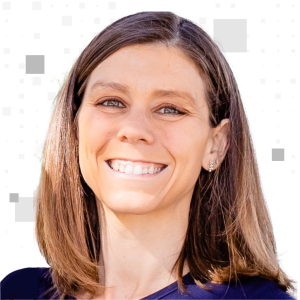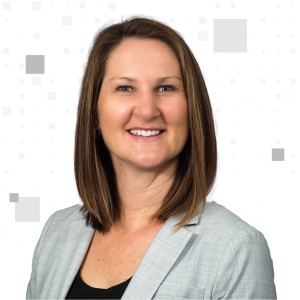Five women who lead startups based on NC State research — and also either hold degrees from the university or teach here — share their insights and perspectives as researchers and startup founders.
This article was originally published on March 7, 2024 by NC State’s Office of Research and Innovation and can be read here.
March is Women’s History Month and Friday, March 8, is International Women’s Day.
In celebration, we’d like to introduce five women in the Wolfpack who’ve launched and led startup companies based on NC State research — all of whom graciously agreed to share their insights and perspectives as researchers and startup founders.
Editor’s Note: The following interview responses have been edited for clarity, concision and adherence to NC State University editorial style guidelines.
Ashley Brown
Ashley Brown, an associate professor of biomedical engineering and the co-director of the Comparative Medicine Institute at NC State, co-founded Selsym Biotech.
Who is a role model that has inspired you in your career?
Several role models have inspired me, and continue to inspire me, throughout my career. One that stands out is Dr. Fran Ligler, who is a “serial inventor.” The breadth of Dr. Ligler’s inventions and her knowledge about the patent process have been extremely inspiring to me.
How do you think we can encourage more women to pursue entrepreneurship?
I think the key is ensuring there’s support and a network for women entrepreneurs.
What drew you to entrepreneurship and encouraged you to form a startup company?
The opportunity to commercialize lifesaving technologies is both what drew me to entrepreneurship and what excites me about forming a startup company. I have also been interested in making the technologies we develop in the lab into viable products.
Seema Nandi
Seema Nandi, CEO of Selsym Biotech, earned her doctorate from NC State and UNC-Chapel Hill’s Joint Department of Biomedical Engineering.
How do you think we can encourage more women to pursue entrepreneurship?
I think visibility within personal networks is really important. I’m not sure I would have truly considered this type of role as a real career possibility if I hadn’t had the example of other colleagues and friends in my professional and personal circles pursuing entrepreneurship roles, but being able to see them lead by example helped make this seem like a tangible and achievable option for my career.
What drew you to entrepreneurship and encouraged you to form a startup company?
I didn’t always envision entrepreneurship as a part of my career, but I became drawn to it over the course of my time in the Biomedical Engineering program. As part of my dissertation work, I was able to take part in the development of innovative technologies that had the potential to really impact patient care and outcomes in the hemorrhage control space, and the more I learned about the opportunities for spinning technology out of university labs to develop them for commercial use, the more excited I became by the chance to translate our synthetic platelet technology out of the laboratory and into the clinic where it could have a significant positive impact for patients.
What advice would you give to researchers who want to form a startup company?
Take advantage of all the resources and incubator systems offered through their tech transfer offices and other institutions that support startups. It can feel very daunting to come into the startup world with a purely technical background, but there are so many opportunities available in our immediate vicinity that can help get you set up for success and help you gain a lot of the critical skills and background knowledge to operate in that space.
Kathryn Polkoff
Kathryn Polkoff, co-founder and CEO of Hoofprint Biome, earned her doctorate from NC State’s College of Veterinary Medicine.
What drew you to entrepreneurship and encouraged you to form a startup company?
I have always been drawn to the applied side of research, and seeing the impact of my work in a real-world application. But what gets me so excited about entrepreneurship is that with a company and with a commercial product, the magnitude of that impact becomes exponential. You are building a solution to real problems, and putting everything you have into seeing it used widely in the world — what more could you want from a career?
How do you think we can encourage more women to pursue entrepreneurship?
For me, a huge influence was just being surrounded by innovation and entrepreneurship. I never would have dreamed of starting a company if I hadn’t seen examples of what a startup looks like — something NC State does well — and if I hadn’t had a co-founder pushing me to look beyond the bounds of academia.
What advice would you give to researchers who want to form a startup company?
Keep making decisions. The pace of a company’s progress is limited by the pace at which decisions are made, and not making a decision is also a decision. This is especially true advice for ladies! Be the one who makes the decision, and see it through.
Amanda Vargochik
Amanda Vargochik, co-founder and chief innovation officer of SinnovaTek, earned her master’s in food science from NC State.
What drew you to entrepreneurship and encouraged you to form a startup company?
If I see something that could be better, I like to have the power to do something about it. When starting SinnovaTek, we saw a need in the market and knew that we were the best equipped to fill it.
I entered into entrepreneurship to make an impact. I love the idea of building something good and doing it the right way. I still love being able to come up with a solution and then quickly implement it.
What advice would you give to researchers who want to form a startup company?
Early on in the company, we took an I-Corps class that NC State offered, specializing in identifying market fit for a technology. Strong market fit is one of the most important pieces in the application of new technology. I’ve seen many times when a technology developer or researcher was in love with the idea of their technology, how it works, and what it can do. That’s fantastic, but until you can clearly communicate how it can solve a problem for your customer in words they can understand and with an economic impact that is feasible, commercial progress will be difficult. There also needs to be enough of those interested customers to fund a full company. Early adopters have been critical to our success, and to get those early adopters on board, we first needed to address their reasons for being interested in working with us.
How do you think we can encourage more women to pursue entrepreneurship?
Entrepreneurship is challenging without access to funding and a safety net. Much of the intrinsic inertia around funding is geared towards a very specific demographic that deselects women and people of color. There are increasingly more funding avenues trying to correct this, but there is still a long way to go, with many seemingly innocent, invisible barriers that exclude these groups. I specifically recall instances when my cofounder was invited to participate in networking activities geared towards male-only groups, or when we’ve been in meetings where other participants only make eye contact with him or address him directly. Relationships and networking are critical to entrepreneurial success, so we need to ensure that these events are inclusive. In this context, ‘inclusive’ means more than just inviting women and people of color; it means creating an environment that allows them to showcase their best selves.
Another significant consideration is support systems. Entrepreneurship often demands erratic and long hours, which can strain personal lives. With a husband and young children, having reliable childcare has been crucial for how well I can perform at work. The past few years, particularly during COVID, have brought numerous last-minute changes to our childcare arrangements and, consequently, my availability. Without a husband who goes above and beyond, supportive parents and in-laws, and an understanding team at work, I likely would not have been able to continue. We must ensure that support structures like childcare are robust and readily available.
Laura Widman
Laura Widman, an associate professor of psychology at NC State, founded Teen Health Research.
What drew you to entrepreneurship and encouraged you to form a startup company?
I have been working with an amazing team of students and colleagues for over 15 years to better understand adolescent relationships and sexual development. I’ve published almost 100 journal articles and even authored an undergraduate textbook in human sexuality. Yet none of these academic publications were of very much help to my sisters when my nieces and nephews started approaching adolescence.
Too often the research that’s done in a university setting ends up sitting on a dusty shelf or being filed away on a computer or in a journal article somewhere. I was drawn to entrepreneurship as a way to get the exciting findings from my team and other researchers out of the university and into the hands of kids and families who might benefit from these insights.
What challenges have you faced in your career and how have you overcome them?
Perfectionism and self-doubt have been two Achilles’ heels throughout my career. They have slowed me down and caused me to miss opportunities because I thought I wasn’t ready or wouldn’t be successful. A couple of years ago I put a sticky note on my computer that says, “Don’t let the perfect be the enemy of the good.” That’s been a helpful reminder when I get stuck on something for too long. I’ve also surrounded myself with a wonderful support system. They believe in me and cheer me on, even when I’m doubting myself.
“Too often, research done in a university setting ends up sitting on a dusty shelf or being filed away somewhere.”
What advice would you give to researchers who want to form a startup company?
Entrepreneurship is not for the faint of heart! The rollercoaster ride of a startup company is very real. I have two pieces of advice: 1) remember your “why” and 2) surround yourself with a great support crew. Over the past couple of years since I started on this entrepreneurship journey, I have been close to quitting many times. I love being a professor and have questioned myself for taking on this whole second job. Then I remember my “why” — my nieces and nephews and all of the kids out there who deserve really awesome sex education. Coming back to that purpose has helped sustain me through the rollercoaster ride.
I’ve also been lucky to have some really amazing mentors, partners and support crew. Everyone in the Office of Research Commercialization has been so encouraging and patient with me as I’ve asked a million questions. I’ve also gotten plugged into the great startup ecosystem in the Triangle through First Flight Venture Centers. I brought on an amazing business partner, Sabrina Percher, who has kept me sane and focused. And my supportive husband and family have cheered me on through all the highs and lows. Keep good people around if you decide to jump into the big unknown of entrepreneurship!








